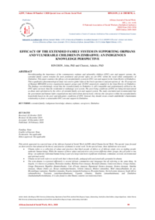ABSTRACT
Notwithstanding the importance of the contemporary orphans and vulnerable children (OVC) care and support systems, the extended family system remains the most prominent and pivotal safety net for OVC within the rural tribal communities of Zimbabwe. This paper examines the efficacy of extended family system in OVC care and support in the Gutu District of Zimbabwe. This a qualitative phenomenological study was used to gather data of the lived experiences and perceptions of the 10 caregivers of Batanai HIV/AIDS service organization support groups and 10 OVC purposively sampled in the Gutu District of Zimbabwe. The findings overwhelmingly reveal that the extended family in Zimbabwe is still compatible and predominantly utilized as the OVC safety net more than the residential or orphanage care system. The poor living conditions of OVC are being misrepresented as abuse and exploitation by the critics of extended family care and support system. The study concluded and recommended that the government and human rights organizations must desist from destructively criticises the caregivers within the extended family households based on the poor and unhygienic conditions of OVC. Instead, they should create a multi-stakeholder’s harmonious relationship to foster a sustainable OVC care and support in Zimbabwe.

